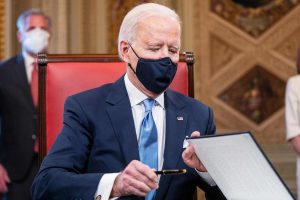Here are the 16 Democratic and Republican senators who may determine the fate of Biden's legislative agenda on stimulus, infrastructure, and taxes

- A group evenly divided between eight Republican and eight Democratic senators could play a key role shaping the Biden legislative agenda, starting with stimulus.
- The group includes moderate senators like Mitt Romney, Susan Collins, Joe Manchin and Mark Warner.
- It may form a center of influence in a Senate with a narrow Democratic majority.
- Visit Business Insider's homepage for more stories.
President Joe Biden wants to draw Republican votes for his proposed $1.9 trillion economic rescue package. Within the Senate, a new and expanded group of largely moderate lawmakers appear to be emerging as an important pathway for the Biden administration to enact its legislative agenda.
Two sources familiar with ongoing discussions confirmed the group's makeup to Insider. A Republican aide also confirmed it. The bipartisan group was first reported by The Washington Post.
The working group is evenly divided between eight Republicans and eight Democrats so far. It may form a center of influence in a Senate that has a narrow Democratic majority as the Biden administration takes up stimulus over the next few weeks, along with infrastructure and possibly taxes later in the year.
GOP senators include:
- Sen. Mitt Romney (Republican of Utah)
- Sen. Susan Collins (Republican of Maine)
- Sen. Lisa Murkowski (Republican of Alaska)
- Sen. Bill Cassidy (Republican of Louisiana)
- Sen. Rob Portman (Republican of Ohio)
- Sen. Jerry Moran (Republican of Kansas)
- Sen. Shelly Moore Capito (Republican of West Virginia)
- Sen. Todd Young (Republican of Indiana)
Democratic senators include:
- Sen. Joe Manchin (Democrat of West Virginia)
- Sen. Mark Warner (Democrat of Virginia)
- Sen. Dick Durbin (Democrat of Illinois)
- Sen. Jeanne Shaheen (Democrat of New Hampshire)
- Sen. Angus King (Independent of Maine, caucuses with Democrats)
- Sen. Maggie Hassan (Democrat of New Hampshire)
- Sen. John Hickenlooper (Democrat of Colorado)
- Sen. Mark Kelly (Democrat of Arizona)
The group appears to be drawing attention from White House. Brian Deese, the White House National Economic Council Director, said he scheduled a call with the group on Sunday about its $1.9 trillion emergency spending proposal.
"We're at a precarious moment for the virus and economy," Deese said during a press conference on Friday. "We risk falling into a very serious economic hole, even more serious than the crisis we find ourselves in."
The plan includes measures like a $1,400 top-up to stimulus checks, unemployment benefits, vaccine funds, and aid to state and local governments. The plan needs 10 GOP votes to pass the Senate through "regular order," the usual path for legislation.
However, even if every Republican in the bipartisan group supported the package, it would still be two votes short from clearing the Senate and reaching Biden's desk.
Read more: 3 investing heavyweights who oversee a combined $922 billion explain how the Democratic sweep and Capitol siege could shape the outlook for mega-cap tech stocks — and break down how to capitalize on the turn of events
A rocky road ahead for the Biden administration's stimulus plan among moderate lawmakers
Biden's relief proposal is already triggering strong opposition among many Republicans in Congress. The White House faces a difficult path to draw Republican votes without major changes to the proposal.
Insider spoke to two GOP senators as well as a Democrat who are part of the group in brief interviews on Capitol Hill.
"It's hard for me to see when we just passed $900 billion of assistance why we would have a package that big," Collins said on Thursday. She suggested a sizable rescue package could potentially gain her support in mid-March, around the same period many enhanced unemployment insurance programs expire.
"Now maybe a couple of months from now, the needs will be evident, and we will need to do something significant," she told Insider. "But I'm not seeing it right now. But again, I'm happy to listen."
That sentiment was echoed by Cassidy. "We have to hear some justification for spending $1.9 trillion when there was money that has literally not been allocated for the exact same things they are talking about," he said, adding some parts of the proposed assistance didn't appear "targeted."
"It seems to be trying to after things that have already been addressed," Cassidy said Thursday. He expressed reluctance to back a $400 federal unemployment benefit until September.
Some Democrats may want to adjust some of the proposed relief proposals as well.
"We need to do something big. I think it needs to be bold, Warner told Insider on Friday. "But I think there may be some priorities that frankly could be included in this package and it might take some tailoring and refining."
Read more: BlackRock bond chief Rick Rieder says investors must think 'dramatically differently' in 2021. Here's what he's bought and sold as he anticipates explosive growth this year.
Source: Read Full Article
